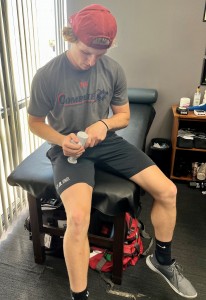From the Trainer’s Room: Four ways to fight fatigue, boost recovery

With fall sports coming back into season, training intensity and frequency will ramp up for many teams, making recovery a prominent aspect of the game.
As physical stress on athletes increases, their bodies are sure to feel the effects.
Fatigue, muscle soreness, and dehydration are some major effects that can hinder an athlete’s performance if they don’t manage their training stress properly.
Here are four ways athletes can fight the fatigue:

1. Rest
Athletes need to make sure they are getting adequate rest time between training sessions. The body needs time to recover and make repairs to itself. Be sure to take 1-2 rest days per week. Without taking rest days, physical stress levels can get too high and overuse injuries can begin to form.
2. Hydration and Nutrition
Our bodies cannot function, let alone perform at their peak, without adequate amounts of food and water. Athletes should make sure they are consuming water, electrolytes, and some form of protein after training and competition to speed up their recovery time. Everybody has different specific needs, so be sure to check in with your healthcare provider if you need guidance on how much is enough.
3. Stretching and Mobility
After physical activity, muscles can get tight and sore, causing discomfort and hindering mobility. To combat this, grab a foam roller or lacrosse ball and massage these muscle groups: glutes, IT bands, hamstrings, quadriceps, calves, and shoulders. Follow up by spending a few minutes stretching each muscle group. This can provide temporary relief from aches and pains.
4. Therapeutic modalities
Therapeutic modalities such as infrared treatment, electrical stimulation, and compression devices are great for providing temporary relief from fatigue and soreness. Though they are not one stop, fix-all treatments, they can be used to help reduce soreness and muscle fatigue when used properly.
While utilizing modalities can be an easy and convenient way to combat soreness, it is important to keep in mind that the primary keys to recovery are listed in the first two steps: proper hydration, adequate nutrition, and plenty of rest, including at least eight hours of sleep each night. Once you have a good routine with these components, you can build upon it with the additional steps.
Chris Phillips is a certified athletic trainer and strength and conditioning specialist and owner of Compete Sports Performance and Rehab in Lake Forest, Calif. Chris has over 30 years’ experience in professional sports, including hockey, soccer, football and the 2022 Winter Olympics.
Contact Chris via email or through the Compete website.
(Aug. 19, 2022)









